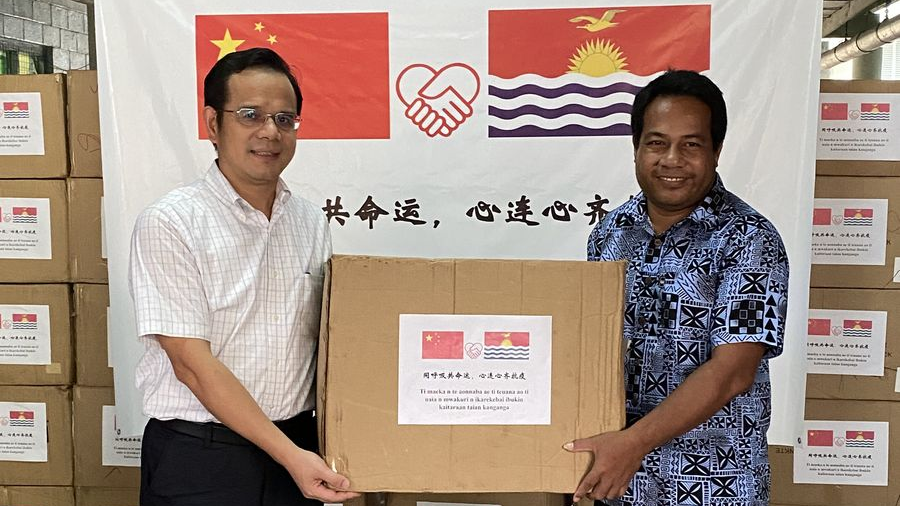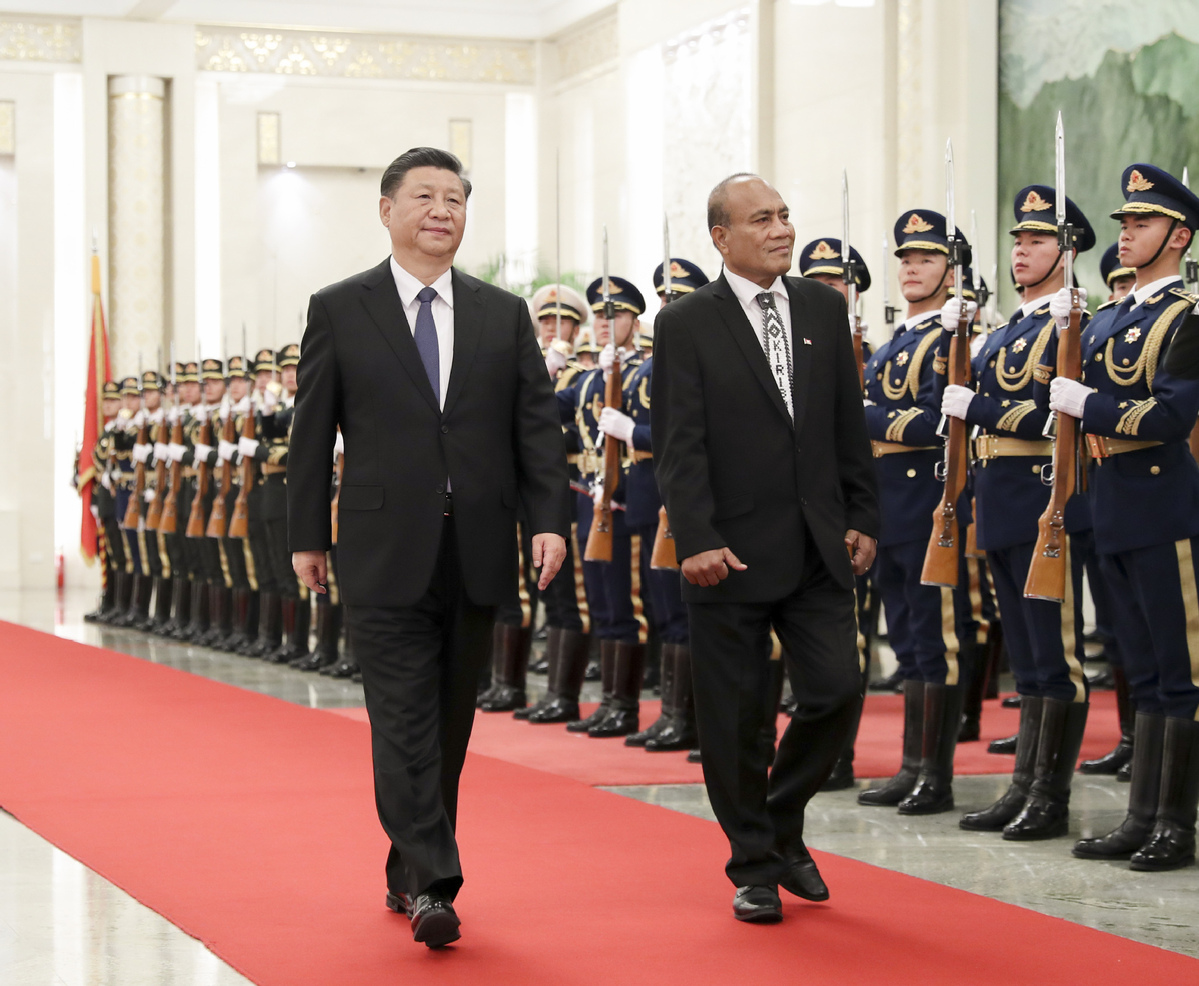
Chinese Ambassador to Kiribati Tang Songgen (L) and Taunaei Marea, Kiribati's health and medical services minister, at the handover ceremony of Chinese donation of medical supplies in Kiribati, May 1, 2020. /Chinese Embassy in Kiribati
Chinese Ambassador to Kiribati Tang Songgen (L) and Taunaei Marea, Kiribati's health and medical services minister, at the handover ceremony of Chinese donation of medical supplies in Kiribati, May 1, 2020. /Chinese Embassy in Kiribati
Editor's note: Hannan Hussain is an assistant researcher at the Islamabad Policy Research Institute (IPRI), and an author. The article reflects the author's opinions, and not necessarily the views of CGTN.
In a landmark visit to Kiribati's Marakei Island, Chinese Ambassador Tang Songgen underscored Beijing's resolve to promote bilateral ties by appealing to local traditions. He expressed this determination by attending the island's generations-old welcoming ceremony, treasured by distinguished hosts as a testament to their prized rituals and shared respect.
However, some foreign officials and reports have distorted Ambassador Tang's symbolic support to Kiribati traditions, ruling it as unacceptable behavior and accusing Beijing of reinforcing a domineering, colonial approach.
"I simply cannot imagine any scenario in which walking on the backs of children is acceptable behavior by an ambassador of any country (or any adult for that matter!)," said U.S. Defense Attaché in the Pacific Islands Constantine Panayiotou in a recent tweet, citing the ambassador's visuals from the ceremony.
Panayiotou's claims – debunked by a Marakei local minister – severely mischaracterize the country's indigenous array of customs, where humble posturing constitutes a high degree of respect towards dignitaries. The remarks also highlight Panayiotou's implicit neglect of Kiribati's right to a unique cultural identity, which should be under no compulsion to appear prescribed or identify as homogeneous.
In truth, it is Beijing's unconditional support for Kiribati's cultural and political self-determination that encouraged Ambassador Tang's August visit, aimed at furthering mutual exchanges and cooperation with the island's locals.
The visit must be seen as an extension of both countries' shared commitments in September last year when Kiribati President Taneti Maamau communicated his nation's desire to "learn and gain" from the Chinese experience of global diplomacy.
Beijing's consequent resolve to develop stronger educational and people-to-people links with locals, align its Belt and Road interests with Kiribati's sovereign pursuits, and ramp up COVID-19 medical assistance, collectively confirm this cooperation as mutual.

President Xi Jinping (L) and Kiribati's President Taneti Maamau attend a welcoming ceremony at the Great Hall of the People in Beijing, capital of China, January 6, 2020. /Xinhua
President Xi Jinping (L) and Kiribati's President Taneti Maamau attend a welcoming ceremony at the Great Hall of the People in Beijing, capital of China, January 6, 2020. /Xinhua
The U.S. Defense Attaché's remarks gained new impetus on August 19, when Bernard Lagan – an Australia-based journalist for The Times – made the erroneous case for a "colonial human welcome mat" being laid out for the Chinese ambassador during the welcoming ceremony.
The report, which leverages a cluster of unofficial expert commentaries to its defense, claims that Kiribati locals were either "willing doormats" or that Ambassador Tang "should not have indulged himself in the human equivalent of the red-carpet treatment."
This derogatory spin understates the joint consensus of the indigenous council of elders, the island council, and the local church to host Tang in Marakei. Besides, the report cites no official stance from China or Kiribati to validate its assessments, effectively compromising its own speculations.
In fact, an August 20 report by Reuters put the spotlight on Asia Pacific experts, including Australian National University Professor Katerina Teaiwa, who said that the pictured ceremony represented a traditional welcome, grounded in Pacific diversity that merits more respect.
Another consistent thread that runs through Sino-Kiribati relations is their unwavering support for bilateralism, independent of external scrutiny.
In June this year, Beijing prioritized Kiribati natives' aspirations by providing its multi-million dollar assistance for livelihood projects in the country. This gesture of firm bilateral support qualifies as an investment in the country's future by two likeminded leaderships.
It is also important to note that during the same period, Western concerns about China's supposed influence-building in the Pacific did not completely subside, but they made no gains with the positive sentiment on the ground.
It is based on these historical and contemporary consistencies that any attempt to damage China's image in the Pacific – including the politicization of Ambassador Tang's ceremony participation – will yield no fruit. Instead, it will only confirm the merits of a long-standing Sino-Kiribati relationship, which has successfully braved sensationalism numerous times in the past and is amply prepared for the future.
(If you want to contribute and have specific expertise, please contact us at opinions@cgtn.com.)